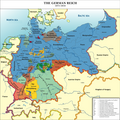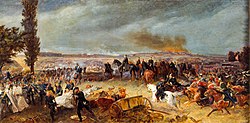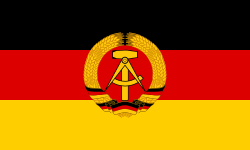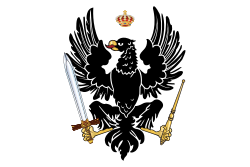The unification of Germany (German: Deutsche Einigung, pronounced [ˈdɔʏtʃə ˈʔaɪnɪɡʊŋ] ) was a process of building the first nation-state for Germans with...
129 KB (15,553 words) - 23:01, 20 May 2025
with full German sovereignty from the four Allied-occupied countries to distinguish it from the process of unification of most of the German states into...
156 KB (16,290 words) - 16:41, 29 May 2025
Anschluss (redirect from Unification of Austria and Germany)
"Greater Germany") arose after the 1871 unification of Germany excluded Austria and the German Austrians from the Prussian-dominated German Empire. It...
111 KB (13,199 words) - 03:29, 25 May 2025
German Confederation was formed in 1815. Formal unification of Germany into the modern nation-state commenced on 18 August 1866 with the North German...
203 KB (16,533 words) - 22:51, 29 May 2025
chancellor. With the unification of Germany and establishment of the German Empire in 1871, the Confederation evolved into a German nation-state and its...
49 KB (1,118 words) - 01:02, 15 May 2025
Prussian-led unification of Germany, the National Liberals became the dominant party in the Reichstag. While supporting the common ideals of liberalism...
19 KB (1,662 words) - 18:16, 30 May 2025
The "German question" was a debate in the 19th century, especially during the Revolutions of 1848, over the best way to achieve a unification of all or...
23 KB (2,590 words) - 02:10, 17 February 2025
Black Hand (Serbia) (redirect from Unification or Death)
the unification of Italy in 1859–1870, but also from the unification of Germany in 1871. Through its connections to the June 1914 assassination of Archduke...
20 KB (1,991 words) - 18:16, 1 May 2025
short-lived Revolutions of 1848 in the German states. It was only during the 1871 unification of Germany that the newly unified German Reich was first assigned...
5 KB (698 words) - 09:41, 28 May 2025
made a re-unification of Germany impossible. Austria could have become a sovereign neutral state in 1956, but a 1952 Soviet suggestion for Germans to form...
138 KB (4,343 words) - 20:03, 31 May 2025
Wilhelm I (redirect from Wilhelm I, Emperor of Germany)
leading German power. In 1871, through Bismarck's maneuvers, the unification of Germany was achieved following the Franco-Prussian War. The German Empire...
61 KB (5,613 words) - 04:50, 28 May 2025
of Austria. In the Franco-Prussian War, the remaining southern German states allied with the North German Confederation, leading to the unification of...
80 KB (7,780 words) - 10:59, 29 May 2025
Austro-Prussian War (redirect from Unification War)
German Confederation. Prussia had also allied with the Kingdom of Italy, linking this conflict to the Third Independence War of Italian unification....
63 KB (6,533 words) - 05:36, 31 May 2025
Deutschlandlied (redirect from National Anthem of Germany)
wrote the lyrics of "Das Lied der Deutschen" as a new text for that music, counterposing the national unification of Germany to the eulogy of a monarch: lyrics...
46 KB (4,563 words) - 06:19, 19 May 2025
German Reich from the unification of Germany in 1871 until the November Revolution in 1918, when the German Reich changed its form of government from a monarchy...
158 KB (16,750 words) - 09:42, 28 May 2025
Otto von Bismarck (redirect from Economy of Germany under Bismarck)
Bismarck; 1 April 1815 – 30 July 1898) was a German statesman and diplomat who oversaw the unification of Germany and served as its first chancellor from 1871...
174 KB (20,231 words) - 04:52, 26 May 2025
power. German universities became world-class centers for science and humanities, while music and art flourished. The unification of Germany was achieved...
364 KB (42,240 words) - 01:49, 30 May 2025
West Germany, and present-day Germany. From 1959 until the unification of Germany in 1990, it was charged with the national emblem, consisting of a hammer...
17 KB (1,770 words) - 22:48, 31 May 2025
with the political unification of Germany under the leadership of Prussia, and was dissolved in 1919, after the defeat of the German Empire in World War...
41 KB (4,381 words) - 02:34, 11 May 2025
unification of Germany under the leadership of Prussia. From 1871 to 1919, the title Deutsches Heer (German Army) was the official name of the German...
47 KB (3,512 words) - 07:26, 25 May 2025
After the unification of Germany, under the reign of the Prussian king Wilhelm I and his Chancellor Otto von Bismarck, the historic German states (e.g...
30 KB (3,965 words) - 15:31, 19 May 2025
Greater Germany. Pan-Germanism was highly influential in German politics in the 19th century during the unification of Germany when the German Empire was...
37 KB (4,010 words) - 08:31, 30 April 2025
Koblenz (redirect from Coblenz, Germany)
confluence is today known as the "German Corner", a symbol of the unification of Germany that features an equestrian statue of Emperor William I. The city celebrated...
36 KB (3,780 words) - 13:48, 10 May 2025
Arminius (category CS1 German-language sources (de))
painting The Tombs of the Old Heroes. During the unification of Germany in the 19th century, Arminius was hailed as a symbol of German unity and liberation...
39 KB (4,513 words) - 10:31, 24 May 2025
was the only son of Emperor Wilhelm I and was raised in his family's tradition of military service. Following the unification of Germany in 1871 his father...
93 KB (9,905 words) - 22:17, 20 May 2025
Prussia (redirect from Prussia (Germany))
after the unification of Germany were the peak of Prussia's fortunes, but the seeds for potential strife were built into the Prusso-German political system...
97 KB (11,107 words) - 23:01, 28 May 2025
Hamburg (redirect from Hamburg, Germany)
history as a member of the medieval Hanseatic League and a free imperial city of the Holy Roman Empire. Before the 1871 unification of Germany, it was a fully...
157 KB (14,843 words) - 10:46, 31 May 2025
Franco-Prussian War (redirect from Occupation of France by Germany from 1870 to 1873)
policies of the Third Republic. The causes of the Franco-Prussian War are rooted in the events surrounding the lead up to the unification of the German states...
118 KB (15,194 words) - 00:46, 18 May 2025
culture. Its opposite is Germanophilia. Anti-German sentiment mainly emerged following the unification of Germany, and it reached its height during World War...
131 KB (13,580 words) - 19:31, 25 May 2025
of the German Empire, the Imperial Flag (Kaiserflagge) or the Realm Flag (Reichsflagge), is a combination between the flag of Prussia and the flag of...
13 KB (1,178 words) - 16:41, 25 May 2025


























